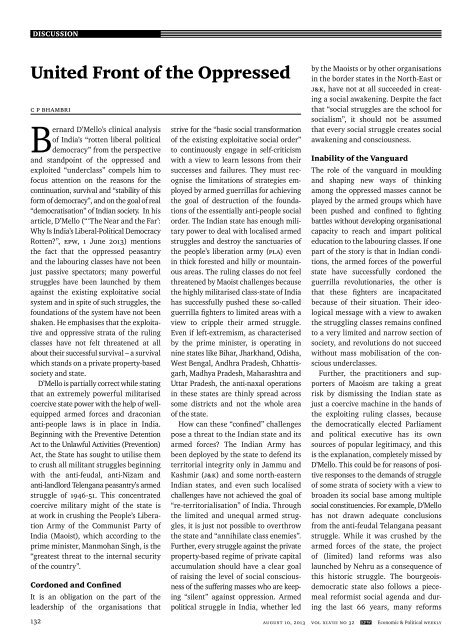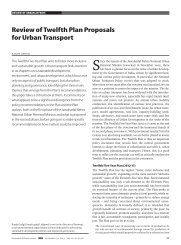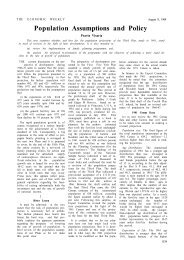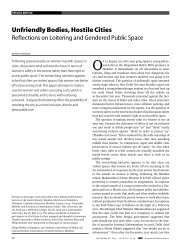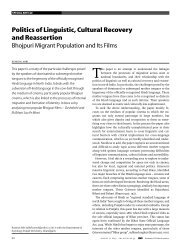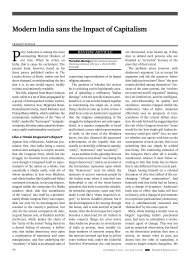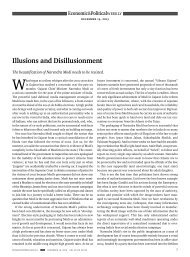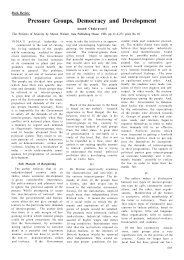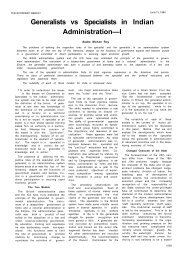United Front of the Oppressed - Economic and Political Weekly
United Front of the Oppressed - Economic and Political Weekly
United Front of the Oppressed - Economic and Political Weekly
You also want an ePaper? Increase the reach of your titles
YUMPU automatically turns print PDFs into web optimized ePapers that Google loves.
DISCUSSION<br />
<strong>United</strong> <strong>Front</strong> <strong>of</strong> <strong>the</strong> <strong>Oppressed</strong><br />
C P Bhambri<br />
Bernard D’Mello’s clinical analysis<br />
<strong>of</strong> India’s “rotten liberal political<br />
democracy” from <strong>the</strong> perspective<br />
<strong>and</strong> st<strong>and</strong>point <strong>of</strong> <strong>the</strong> oppressed <strong>and</strong><br />
e xploited “underclass” compels him to<br />
focus attention on <strong>the</strong> reasons for <strong>the</strong><br />
continuation, survival <strong>and</strong> “stability <strong>of</strong> this<br />
form <strong>of</strong> democracy”, <strong>and</strong> on <strong>the</strong> goal <strong>of</strong> real<br />
“demo cratisation” <strong>of</strong> Indian society. In his<br />
article, D’Mello (“ ‘The Near <strong>and</strong> <strong>the</strong> Far’:<br />
Why Is India’s Liberal-<strong>Political</strong> D emo cracy<br />
Rotten?”, EPW, 1 June 2013) mentions<br />
<strong>the</strong> fact that <strong>the</strong> oppressed peasantry<br />
<strong>and</strong> <strong>the</strong> labouring classes have not been<br />
just passive spectators; many powerful<br />
struggles have been launched by <strong>the</strong>m<br />
against <strong>the</strong> existing exploitative social<br />
system <strong>and</strong> in spite <strong>of</strong> such struggles, <strong>the</strong><br />
foundations <strong>of</strong> <strong>the</strong> system have not been<br />
shaken. He emphasises that <strong>the</strong> exploitative<br />
<strong>and</strong> oppressive strata <strong>of</strong> <strong>the</strong> ruling<br />
classes have not felt threatened at all<br />
about <strong>the</strong>ir successful survival – a survival<br />
which st<strong>and</strong>s on a private property-based<br />
s ociety <strong>and</strong> state.<br />
D’Mello is partially correct while stating<br />
that an extremely powerful militarised<br />
coercive state power with <strong>the</strong> help <strong>of</strong> wellequipped<br />
armed forces <strong>and</strong> draconian<br />
anti-people laws is in place in I ndia.<br />
Beginning with <strong>the</strong> Preventive Detention<br />
Act to <strong>the</strong> U nlawful Activities (Prevention)<br />
Act, <strong>the</strong> State has sought to utilise <strong>the</strong>m<br />
to crush all militant struggles beginning<br />
with <strong>the</strong> anti-feudal, anti- Nizam <strong>and</strong><br />
anti-l<strong>and</strong>lord Telengana peasantry’s armed<br />
struggle <strong>of</strong> 1946-51. This concentrated<br />
coercive military might <strong>of</strong> <strong>the</strong> state is<br />
at work in crushing <strong>the</strong> People’s Liberation<br />
Army <strong>of</strong> <strong>the</strong> Communist Party <strong>of</strong><br />
India (Maoist), which a ccording to <strong>the</strong><br />
prime minister, Manmohan Singh, is <strong>the</strong><br />
“greatest threat to <strong>the</strong> internal security<br />
<strong>of</strong> <strong>the</strong> country”.<br />
Cordoned <strong>and</strong> Confined<br />
It is an obligation on <strong>the</strong> part <strong>of</strong> <strong>the</strong><br />
l eadership <strong>of</strong> <strong>the</strong> organisations that<br />
132<br />
strive for <strong>the</strong> “basic social transformation<br />
<strong>of</strong> <strong>the</strong> existing exploitative social o rder”<br />
to continuously engage in self-criticism<br />
with a view to learn lessons from <strong>the</strong>ir<br />
successes <strong>and</strong> failures. They must recognise<br />
<strong>the</strong> limitations <strong>of</strong> strategies employed<br />
by armed guerrillas for achieving<br />
<strong>the</strong> goal <strong>of</strong> destruction <strong>of</strong> <strong>the</strong> foundations<br />
<strong>of</strong> <strong>the</strong> essentially anti-people social<br />
order. The Indian state has enough military<br />
power to deal with l ocalised armed<br />
struggles <strong>and</strong> destroy <strong>the</strong> sanctuaries <strong>of</strong><br />
<strong>the</strong> people’s liberation army (PLA) even<br />
in thick forested <strong>and</strong> hilly or mountainous<br />
areas. The ruling classes do not feel<br />
threatened by Maoist challenges because<br />
<strong>the</strong> highly militarised class-state <strong>of</strong> India<br />
has successfully pushed <strong>the</strong>se so-called<br />
guerrilla fighters to limited areas with a<br />
view to cripple <strong>the</strong>ir armed struggle.<br />
Even if left- extremism, as characterised<br />
by <strong>the</strong> prime minister, is operating in<br />
nine states like Bihar, Jharkh<strong>and</strong>, Odisha,<br />
West Bengal, Andhra Pradesh, Chhattisgarh,<br />
Madhya Pradesh, Maha rashtra <strong>and</strong><br />
Uttar Pradesh, <strong>the</strong> anti-naxal operations<br />
in <strong>the</strong>se states are thinly spread across<br />
some districts <strong>and</strong> not <strong>the</strong> whole area<br />
<strong>of</strong> <strong>the</strong> state.<br />
How can <strong>the</strong>se “confined” challenges<br />
pose a threat to <strong>the</strong> Indian state <strong>and</strong> its<br />
armed forces? The Indian Army has<br />
been deployed by <strong>the</strong> state to defend its<br />
territorial integrity only in Jammu <strong>and</strong><br />
Kashmir (J&K) <strong>and</strong> some north-eastern<br />
Indian states, <strong>and</strong> even such localised<br />
challenges have not achieved <strong>the</strong> goal <strong>of</strong><br />
“re-territorialisation” <strong>of</strong> India. Through<br />
<strong>the</strong> limited <strong>and</strong> unequal armed struggles,<br />
it is just not possible to overthrow<br />
<strong>the</strong> state <strong>and</strong> “annihilate class enemies”.<br />
Fur<strong>the</strong>r, every struggle against <strong>the</strong> p rivate<br />
property-based r egime <strong>of</strong> private capital<br />
accumulation should have a clear goal<br />
<strong>of</strong> raising <strong>the</strong> level <strong>of</strong> social consciousness<br />
<strong>of</strong> <strong>the</strong> suffering masses who are keeping<br />
“ silent” against oppression. Armed<br />
p olitical struggle in India, whe<strong>the</strong>r led<br />
by <strong>the</strong> Maoists or by o<strong>the</strong>r organisations<br />
in <strong>the</strong> border states in <strong>the</strong> North-East or<br />
J&K, have not at all succeeded in creating<br />
a social awakening. Despite <strong>the</strong> fact<br />
that “social struggles are <strong>the</strong> school for<br />
socialism”, it should not be assumed<br />
that every social struggle creates social<br />
awakening <strong>and</strong> c onsciousness.<br />
Inability <strong>of</strong> <strong>the</strong> Vanguard<br />
The role <strong>of</strong> <strong>the</strong> vanguard in moulding<br />
<strong>and</strong> shaping new ways <strong>of</strong> thinking<br />
among <strong>the</strong> oppressed masses cannot be<br />
played by <strong>the</strong> armed groups which have<br />
been pushed <strong>and</strong> confined to fighting<br />
battles without developing organisational<br />
capacity to reach <strong>and</strong> impart p olitical<br />
education to <strong>the</strong> labouring classes. If one<br />
part <strong>of</strong> <strong>the</strong> story is that in Indian conditions,<br />
<strong>the</strong> armed forces <strong>of</strong> <strong>the</strong> powerful<br />
state have successfully cordoned <strong>the</strong><br />
guerrilla revolutionaries, <strong>the</strong> o<strong>the</strong>r is<br />
that <strong>the</strong>se fighters are incapacitated<br />
b ecause <strong>of</strong> <strong>the</strong>ir situation. Their ideological<br />
message with a view to awaken<br />
<strong>the</strong> struggling classes remains confined<br />
to a very limited <strong>and</strong> narrow section <strong>of</strong><br />
society, <strong>and</strong> revolutions do not succeed<br />
without mass mobilisation <strong>of</strong> <strong>the</strong> conscious<br />
underclasses.<br />
Fur<strong>the</strong>r, <strong>the</strong> practitioners <strong>and</strong> supporters<br />
<strong>of</strong> Maoism are taking a great<br />
risk by dismissing <strong>the</strong> Indian state as<br />
just a coercive machine in <strong>the</strong> h<strong>and</strong>s <strong>of</strong><br />
<strong>the</strong> exploiting ruling classes, because<br />
<strong>the</strong> democratically elected Parliament<br />
<strong>and</strong> political executive has its own<br />
sources <strong>of</strong> popular legitimacy, <strong>and</strong> this<br />
is <strong>the</strong> explanation, completely missed by<br />
D’Mello. This could be for reasons <strong>of</strong> positive<br />
responses to <strong>the</strong> dem<strong>and</strong>s <strong>of</strong> struggle<br />
<strong>of</strong> some strata <strong>of</strong> society with a view to<br />
broaden its social base among multiple<br />
social constituencies. For example, D’Mello<br />
has not drawn adequate conclusions<br />
from <strong>the</strong> anti- feudal Telangana peasant<br />
struggle. While it was crushed by <strong>the</strong><br />
armed forces <strong>of</strong> <strong>the</strong> state, <strong>the</strong> project<br />
<strong>of</strong> (limited) l<strong>and</strong> reforms was also<br />
launched by Nehru as a consequence <strong>of</strong><br />
this historic struggle. The bourgeoisdemocratic<br />
state also f ollows a piecemeal<br />
reformist social agenda <strong>and</strong> during<br />
<strong>the</strong> last 66 years, many reforms<br />
august 10, 2013 vol xlviiI no 32 EPW <strong>Economic</strong> & <strong>Political</strong> <strong>Weekly</strong>
have been undertaken by <strong>the</strong> bourgeois<br />
state because <strong>of</strong> popular pressures.<br />
Democratic Space<br />
It should not be forgotten that even<br />
a “rotten political democracy” provides<br />
enough space for limited democratic<br />
struggles launched by different fractions<br />
<strong>of</strong> <strong>the</strong> exploited labouring classes.<br />
An i nherent characteristic <strong>of</strong> <strong>the</strong> classstate<br />
is that it confronts violent antistate<br />
class struggles with a view to crush<br />
<strong>the</strong>m. At <strong>the</strong> same time, it res ponds<br />
positively, sometimes even enthusiastically<br />
<strong>and</strong> at o<strong>the</strong>r times hesitantly, <strong>and</strong><br />
negotiates with agitating social groups<br />
<strong>and</strong> leaders <strong>and</strong> accommodates <strong>the</strong>ir<br />
interests <strong>and</strong> aspirations. Fur<strong>the</strong>r, competitive<br />
politics in political democracy is<br />
played by competing parties by raising<br />
dem<strong>and</strong>s <strong>of</strong> <strong>the</strong>ir special social constituencies<br />
<strong>and</strong> by compelling political opponents<br />
to ei<strong>the</strong>r accept dem<strong>and</strong>s <strong>of</strong> special<br />
social groups or face agitations <strong>and</strong><br />
threats <strong>of</strong> losing an election.<br />
It is left to <strong>the</strong> parties <strong>and</strong> leaders <strong>of</strong><br />
<strong>the</strong> socially deprived <strong>and</strong> exploited strata<br />
<strong>of</strong> society in a liberal demo cracy to<br />
exp<strong>and</strong> <strong>and</strong> extend <strong>the</strong> area <strong>of</strong> struggles<br />
in <strong>the</strong> spaces which are available. India<br />
is not an exception to this general rule.<br />
Hence, <strong>the</strong> central <strong>and</strong> critical problem<br />
faced by <strong>the</strong> leaders <strong>of</strong> mass movements<br />
is to create a powerful fighting force<br />
<strong>of</strong> <strong>the</strong> oppressed by forming a united<br />
front <strong>of</strong> <strong>the</strong> victims <strong>of</strong> <strong>the</strong> existing social<br />
order. Why have <strong>the</strong> progressive sections<br />
<strong>of</strong> political leadership not been<br />
able to create a powerful fighting force<br />
<strong>of</strong> <strong>the</strong> oppressed against an unequal <strong>and</strong><br />
unjust social order? I ndia has not experienced<br />
any all-India mass-based resistance<br />
movement which is taken notice <strong>of</strong><br />
by <strong>the</strong> ruling classes <strong>and</strong> political executives<br />
<strong>of</strong> <strong>the</strong> Indian state. It is a historically<br />
validated fact that <strong>the</strong> exploiting ruling<br />
classes continue <strong>the</strong>ir journey <strong>of</strong> ruthless<br />
capital accumulation when <strong>the</strong>y are not<br />
under threat from any formidable united<br />
front <strong>of</strong> <strong>the</strong> oppressed.<br />
The French Revolution <strong>of</strong> 1789 succeeded<br />
in overthrowing <strong>the</strong> “ancien<br />
r egime” <strong>of</strong> monarchy-aristocracy <strong>and</strong><br />
feudal classes because <strong>the</strong> exploited had<br />
united against <strong>the</strong> oppressors, d emolished<br />
<strong>the</strong> old <strong>and</strong> established <strong>the</strong> new.<br />
Utsa Patnaik in an introduction to <strong>the</strong><br />
Agrarian Question in Marx <strong>and</strong> His<br />
Successors (2011) observes that<br />
<strong>the</strong> 20th century was a century <strong>of</strong> revolutions<br />
which permanently altered <strong>the</strong> trajectory<br />
<strong>of</strong> future development <strong>of</strong> a large<br />
segment <strong>of</strong> human society. In <strong>the</strong>se revolutions<br />
<strong>the</strong> peasantry had a major, even leading<br />
part to play. In two large <strong>and</strong> populous<br />
nations, Russia <strong>and</strong> China, political movements<br />
based on Marxism <strong>and</strong> proletarian<br />
ideology harnessed <strong>the</strong> revolutionary energies<br />
<strong>of</strong> <strong>the</strong> peasantry to overthrow <strong>the</strong> old<br />
regime, end l<strong>and</strong> monopoly <strong>and</strong> radically<br />
refashion agrarian relations, laying <strong>the</strong><br />
basis for a re-ordering <strong>of</strong> <strong>the</strong> entire gamut <strong>of</strong><br />
social relations.<br />
While history does not repeat itself<br />
in a mechanical manner, unlike Russia<br />
<strong>and</strong> China, Lenin <strong>and</strong> Mao, Moh<strong>and</strong>as<br />
G <strong>and</strong>hi launched his anti-colonial national<br />
liberation movement by mobilising <strong>and</strong><br />
activating Indian peasantry to fight against<br />
exploitation <strong>of</strong> <strong>the</strong> whole <strong>of</strong> I ndian society<br />
by British colonisers. The historical exceptionalism<br />
<strong>of</strong> <strong>the</strong> Indian <strong>and</strong> G<strong>and</strong>hian<br />
leadership that relied upon gradualism<br />
did not shake caste- <strong>and</strong> religion-based<br />
social life <strong>of</strong> agrarian I ndia. The inheritance<br />
<strong>of</strong> this legacy has directly affected<br />
<strong>the</strong> story <strong>of</strong> post-Independence social<br />
struggles because caste versus caste or<br />
religion versus religion social relations<br />
have fragmented <strong>the</strong> whole society <strong>and</strong><br />
strata <strong>of</strong> <strong>the</strong> underclasses both horizontally<br />
<strong>and</strong> vertically.<br />
Misplaced Characterisation<br />
D’Mello by characterising <strong>the</strong> Indian<br />
class-state essentially as “caste-ridden<br />
Brahmanical-Hindu communal” has<br />
nei<strong>the</strong>r related this social structure with<br />
<strong>the</strong> history <strong>of</strong> India nor has he f ocused<br />
attention on its impact on <strong>the</strong> struggles<br />
<strong>of</strong> <strong>the</strong> working classes. The unstoppable<br />
caravan <strong>of</strong> dem<strong>and</strong>s for reservations in<br />
public institutions has solidified casteism<br />
<strong>and</strong> caste consciousness. It has obstructed<br />
<strong>the</strong> growth <strong>of</strong> mass social consciousness<br />
for unity against <strong>the</strong> existing social order.<br />
Caste versus caste-based struggles are<br />
e ngaged in finding <strong>the</strong> causes <strong>of</strong> caste<br />
o ppression in <strong>the</strong>ir historical inheritance,<br />
<strong>and</strong> <strong>the</strong>se prisoners <strong>of</strong> <strong>the</strong> past<br />
have not become socially awakened to<br />
underst<strong>and</strong> that <strong>the</strong> basic reasons <strong>of</strong><br />
s ocial oppression lie in <strong>the</strong> present<br />
e xploitative capitalist social order.<br />
DISCUSSION<br />
The past determines <strong>the</strong> consciousness<br />
<strong>of</strong> caste groups, <strong>and</strong> <strong>the</strong> present ruling<br />
groups are happy with it. The growing<br />
ritual-based religious practices <strong>of</strong> <strong>the</strong><br />
Hindus have affected <strong>the</strong> thinking about<br />
social surroundings, <strong>and</strong> <strong>the</strong> priestly<br />
classes have succeeded in making believers<br />
fatalists content in <strong>the</strong>ir destiny<br />
which is determined by <strong>the</strong> accident <strong>of</strong><br />
birth. It is no one’s case that <strong>the</strong> oppressed<br />
classes are homogeneous social<br />
groups; <strong>the</strong> problem is that internal differentiation<br />
among <strong>the</strong> peasantry <strong>and</strong><br />
<strong>the</strong> labouring classes has been equated<br />
with caste-based fragmentation. It is<br />
easy to mobilise a fraction <strong>of</strong> a caste to<br />
launch a struggle for a specific dem<strong>and</strong><br />
felt by <strong>the</strong> caste group than to launch a<br />
united struggle for establishing an alternative<br />
equality-based socialist social order.<br />
A particular caste group <strong>of</strong> peasantry<br />
can launch a movement for minimum<br />
support price for wheat or sugar but <strong>the</strong><br />
caste-divided l<strong>and</strong>less agricultural worker<br />
base is unable to launch a united<br />
struggle for guaranteed payment <strong>of</strong> minimum<br />
wages for work.<br />
The irony in India is that unlike Russia<br />
<strong>and</strong> China where <strong>the</strong> vanguard role was<br />
played by leaders who had succeeded<br />
in uniting <strong>the</strong> oppressed massses, <strong>the</strong><br />
Indian vanguard parties are <strong>the</strong>mselves<br />
fragmented into various communist parties.<br />
These d ivided communists cannot<br />
lead a united front <strong>of</strong> <strong>the</strong> oppressed. The<br />
upshot <strong>of</strong> <strong>the</strong> above description is that a<br />
necessity for forming a united front <strong>of</strong><br />
<strong>the</strong> oppressed has to be felt by fragmented<br />
communists because it is only <strong>the</strong>n<br />
that <strong>the</strong>y can challenge <strong>the</strong> class power<br />
<strong>of</strong> <strong>the</strong> exploiters. D’Mello blames <strong>the</strong><br />
rulers for following <strong>the</strong> policy <strong>of</strong> social<br />
“divide to rule”, while <strong>the</strong> issue is that<br />
fragmented communists cannot o rganise<br />
a revolution <strong>of</strong> any kind. This is <strong>the</strong> crux<br />
<strong>of</strong> <strong>the</strong> issue.<br />
available at<br />
Altermedia-Bookshop Ecoshop<br />
M G Road<br />
Thrissur 680 001,<br />
Kerala<br />
Ph: 2422974<br />
<strong>Economic</strong> & <strong>Political</strong> <strong>Weekly</strong> EPW august 10, 2013 vol xlviiI no 32 133


